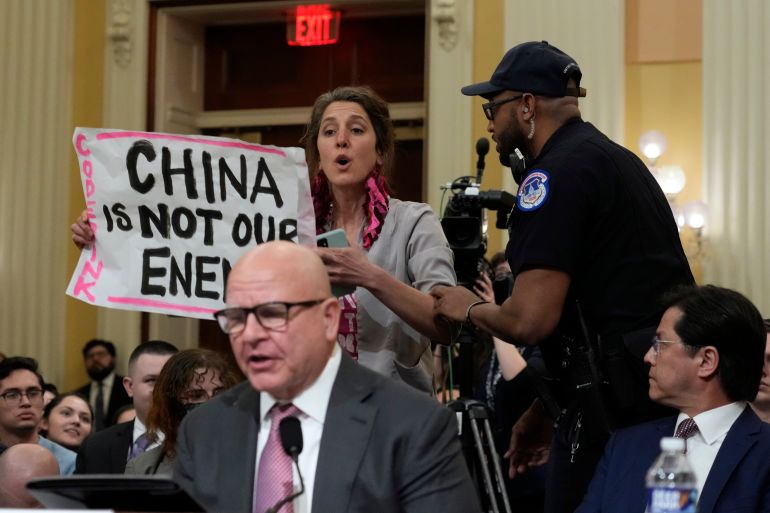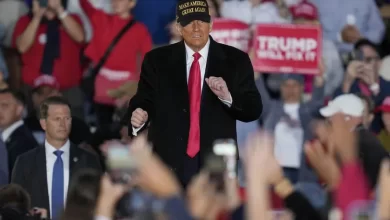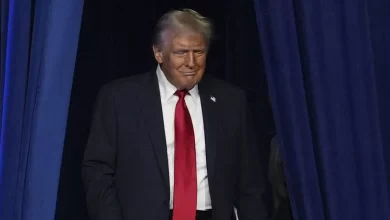New US House committee on China cites ‘existential struggle’

New panel’s efforts to counter Beijing are likely to put pressure on US President Joe Biden to take a firmer line.

The chair of a new bipartisan committee on China in the United States House of Representatives has framed the rivalry between the US and China as “an existential struggle” at the panel’s first hearing.
The meeting of the committee — formally known as the House of Representatives Select Committee on the Strategic Competition Between the United States and the Chinese Communist Party (CCP) — comes amid heightened tension between Beijing and Washington after a suspected Chinese spy balloon flying over North America was shot down.
“This is not a polite tennis match. This is an existential struggle over what life will look like in the 21st century — and the most fundamental freedoms are at stake,” said Mike Gallagher, the committee’s Republican chairperson, as he opened the hearing.
The top Democrat on the committee said the initiative was part of an effort to convince people in the US about why they should care about competing with China, and to “selectively decouple” the two countries’ economies. The committee has strong support across the House and the vote to create it was bipartisan, 365-65.
“Over the last three decades, both Democrats and Republicans underestimated the CCP, and assumed that trade and investment would inevitably lead to democracy and greater security in the Indo-Pacific … Instead the opposite happened,” Raja Krishnamoorthi, a legislator from Illinois, said in his opening remarks.
“We do not want a war with the [People’s Republic of China], not a cold war, not a hot war,” Krishnamoorthi said. “We don’t want a clash of civilisations. But we seek a durable peace and that is why we have to deter aggression.”
Tensions between the US and China have been rising for years, aggravated by China’s handling of the COVID-19 pandemic, which emerged in the central city of Wuhan in 2019, actions in Hong Kong and Xinjiang, aggression towards Taiwan, and the recent spy balloon flight.
The new committee, which includes 13 Republicans and 11 Democrats, is expected to be at the centre of legislators’ efforts to counter Beijing over the next two years and is likely to put pressure on US President Joe Biden to take a firmer line on China.
“It’s another indication of the negative slide, the downward spiral, in the US-China relationship,” Michael Swaine, a Washington, DC-based analyst of Chinese security studies, said of the committee.
Gallagher has assured those concerned the committee’s work could help drive anti-Asian hate crimes that he is committed to ensuring the focus is on the Chinese Communist Party, not on the people of China.
‘Feeding the dragon’
Tuesday’s hearing had four witnesses, including H R McMaster, a retired Army lieutenant general who was former Republican President Donald Trump’s national security adviser, and Matt Pottinger, a longtime China hawk who was Trump’s deputy national security adviser.
McMaster said the US had to put a priority on expediting delivery of billions of dollars of weapons and munitions that Taiwan has already purchased. “As we might have learned from Ukraine’s experience, it is much cheaper to deter a war than to fight one,” he said in his written testimony.
In a nod to growing US concerns about China’s influence on technology, Pottinger said Washington should partner with US technology firms that are banned in China and find a way for people in China to circumvent the country’s strict internet censorship.
“I think you could punch holes in the great Chinese firewall,” Pottinger said.
Committee members have already held several events to draw attention to China-linked human rights concerns, including a rally on Saturday outside what US officials have said is an illegal Chinese Communist Party “police station” in New York City.

Gallagher sent a letter to the Federal Bureau of Investigation (FBI) last week seeking information about the alleged police outposts. Beijing has denied operating such facilities in the US.
Some Chinese dissidents and advocates also spoke at Tuesday’s hearing.
Tong Yi, who was arrested in the 1990s after serving as an interpreter to a leading dissident who had urged the US to link trade to China’s human rights performance, amplified the concerns. She spent nine months in detention before being handed a two-and-half-year sentence for “disturbing social order” and sent to a labour camp, where she said authorities organised other inmates to beat her up.
Tong is now a naturalised US citizen.
“In the US, we need to face the fact that we have helped feed the baby dragon of the CCP until it has grown into what it now is,” she said.







